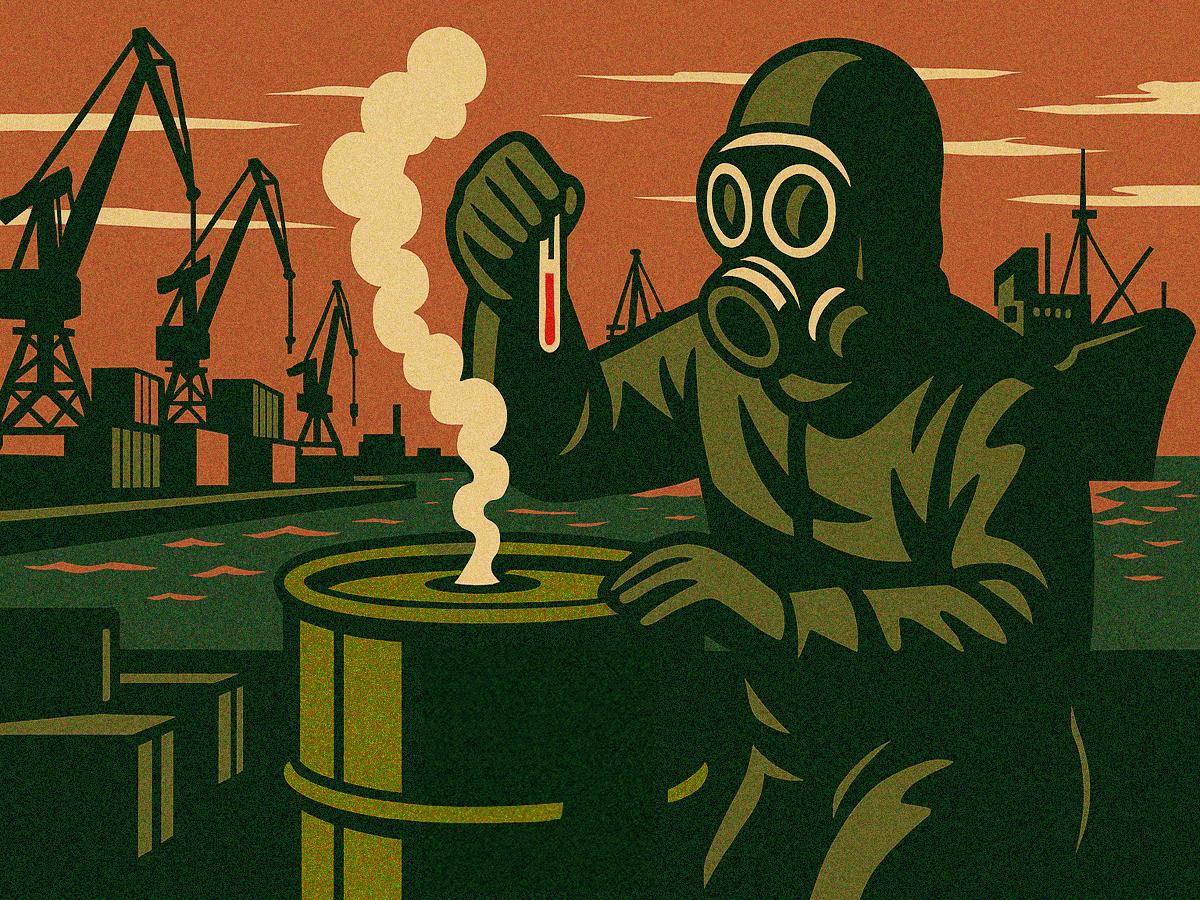The investigation reveals how a Belarusian company VLATE Lahistyk supplied Russia with N-methyl-2-pyrrolidone (NMP), a sanctioned solvent that can be used both in civilian industry and chemical weapons production. The scheme was uncovered through Operation Vial in Barcelona, where Spanish authorities seized 13 tons of the substance.
The key findings include:
- VLATE Lahistyk used shell companies in Kyrgyzstan and Armenia to circumvent sanctions and deliver NMP to Russia
- The company has links to three of Lukashenko's close business associates: Alexander Zaytsev, Aliaksei Aleksin, and Nikolay Vorobey
- In 2023-2024, about 74 tons of chemicals worth $800,000 were supplied to Russian company Katrosa Reaktiv
- Among the end recipients were Russian military research institutes, including those sanctioned by the US for involvement in chemical weapons development
The investigation also uncovered that VLATE Lahistyk wasn't just moving NMP - they were involved in multiple sanctions evasion schemes worth over $15 million.
Though VLATE Lahistyk was sanctioned by the EU and US in late 2024, the investigation found that a related company, Handliovy dom EKSPARTHANDAL, has continued similar operations, including supplying microchips to Russia.
A Belarusian company supplied Russia with a sanctioned solvent through shell companies in Kyrgyzstan and Armenia. It is a substance that can be used both in private industry and in the production of chemical weapons. The BIC found that the illegal supply chain involved businessmen close to Aleksandr Lukashenko.
The investigation was produced in collaboration with All Eyes on Wagner, Vazhnye Istorii, Slidstvo.info, and OCCRP, with support from the activist group CyberPartisans.
Autumn 2024. Barcelona. A port terminal. Cargo containers are inspected by two dozen customs officers and armed police. A lift truck removes metal drums. A man wearing gloves and a gas mask pours a sample into a glass vial.
This is Operation Vial, which started back in 2022. Spanish law enforcement agencies reported that they had uncovered a trail for supplying Russia with a banned chemical. They seized 13 tons.
The reagent could be a precursor for the production of chemical weapons, according to Spanish National Police. Radio Free Europe/Radio Liberty Ukraine journalists suggested that it could be used to produce intercontinental ballistic missiles and batteries for Russia’s top-secret Losharik submarine.
The BIC tried to find out who was sending the chemicals to whom, and for what purpose — and discovered a Belarusian trail linked to three of Aleksandr Lukashenko’s “moneybags”.
Multi-use chemical
A video of the seizure released by Spanish police shows drums labeled NMP. It is an abbreviation for N-methyl-2-pyrrolidone, a powerful colorless solvent with high chemical and thermal stability. The substance is used in the manufacture of agrochemicals, paints and similar coatings, adhesives and sealants, and also for cleaning of conductors in the electronics industry, in the pharmaceutical industry, and other fields.
“It probably has the widest application ... It is used in the petrochemical, polymer and battery industries,” Mykola Obushak, head of the Organic Chemistry Department at Lviv National University, told BIC.
Obushak said that NMP also has military uses in high-capacity batteries and kevlar, the high-strength fiber used in military uniforms. He said it is also used to synthesize dangerous chemical compounds, including poisons for K-51 and RG-VO shells.
International conventions prohibit the use of chemical weapons in warfare. But Ukrainian soldiers say they know first-hand how it works: “There’s an extreme stench (in the room where a chemical shell hits). It just roasts you, it offends your eyes, and you just can’t stay there ... Many of my comrades suffered from this gas,” Kyrylo Lazarevych, a former paratrooper in the Ukrainian Airborne Assault Troops, told BIC.
From February 15, 2023, to May 29, 2025, the General Staff of the Armed Forces of Ukraine recorded 9,167 cases of the use of hazardous chemical substances by Russian troops. A representative of the agency reported at a briefing on May 30, 2025: “In gas grenades, the Russians use tear-irritants (CS, CN), which are typically employed by police against demonstrators.”
The European Union banned exporting of NMP to Russia in the spring of 2022 after the whole world saw the shocking images from the Kyiv suburb of Bucha.
Fictitious customer
In the case concerning the supply of a sanctioned chemical in Catalonia, police detained nine suspects. Three of them are members of the same family from Russia: Maria, Vyacheslav, and Irina Oleynikovs. All the suspects were later released, but they remain under investigation.
The Oleynikovs opened Cavina, a restaurant serving wine and tapas in Barcelona in 2024. They also opened a chain of gastro bars under the same name in Moscow and St Petersburg. But food and wine were not all the family brought to Russia from Spain. Prohibited substances were also shipped.
Investigators suspect that Maria Oleynikova was at the center of the alleged scheme through which Spanish companies sent chemicals to Russia in circumvention of EU sanctions. A source in the Spanish police told our partners at OCCRP about this. Oleynikova is a co-owner of the Spanish company Catrosa Productos Quimicos SL; she also owns Complexe Sancu SL in Spain, which is run by her children, Vyacheslav and Irina Oleynikovs. She also has a stake in Russia’s OOO Katrosa Reaktiv, the ultimate recipient of the sanctioned solvent.
According to Russian customs data, after the ban on NMP exports to Russia, Katrosa Reaktiv purchased approximately 16 tons of N-methyl-2-pyrrolidone in 2023. In 2024, it bought 21.3 tons under the same commodity code but without a product name. Sixteen tons came from Complexe Sancu SL. A Belarusian company, TAA "VLATE Lahistyk" (OOO VLATE Logistik, a limited liability company under the laws of the Belarus), supplied the remaining five tons. [*] [*]
We obtained customs data showing that VLATE Lahistyk supplied chemicals on behalf of the Kyrgyz company OOO NK Muras and the Armenian company OOO Avinex. Both were set up after the outbreak of the full-scale war and the imposition of Western sanctions against Russia. NK was registered in February 2023 while Avinex emerged in March 2022. [*] [*]
Customs declarations show Kyrgyzstan and Armenia as the trading countries, but the goods were shipped from Belarus. It appears the sanctioned chemical was formally destined for Bishkek and Yerevan, but was diverted to Russia. [*]
Spanish police in February 2025 reported that Kyrgyz and Armenian front companies were being used to deliver the solvent to Moscow.
Who is the merchant?
The Russian company Katrosa Reaktiv reportedly received about 15 tons of NMP valued at about $330,000 from VLATE Lahistyk in 2023. This is almost the entire volume of solvents imported by Katrosa Reaktiv in 2023. In total, 74 tons of chemicals worth around $800,000 were supplied to the Russian company in 2023-2024 under the commodity code that includes NMP. It cannot be stated with certainty that it all was specifically NMP, as other chemical substances are also classified under the same code. In addition, our data on volumes and costs shipped may be incomplete.
According to bank records, between 2023 and 2024 Katrosa Reaktiv supplied $1.3 million worth of NMP to the pharmaceutical company JSC "PharmFirma Sotex" and the FSUE “Moscow Endocrine Plant”. It is impossible to determine precisely how many tons the pharmaceutical companies bought, as the documents only show the financial amounts of the transactions. [*]
Organizations linked to the Russian defense sector are among the customers of Katrosa Reaktiv in 2022-2024. Specifically, the 18th Central Research Institute related to military intelligence. The list of clients also includes the Scientific Research Institute of Applied Acoustics, which has been sanctioned by the United States for purchasing chemicals that can be used to make chemical warfare agents, and the FGUP “State Research Institute of Organic Chemistry and Technology”, which the United States and European Union name as the developer of the Novichok poison, traces of which were found in the blood of Russian dissident Alexei Navalny after he was poisoned.
It cannot be stated with certainty that all were purchasing NMP, as bank documents do not always specify which particular reactive agents were bought. In total, Katrosa Reaktiv supplied chemicals worth approximately $65,000.
The BIC sent enquiries to the email address of the company Katrosa Reaktiv to clarify whether they were aware of the purposes for which the end buyers were purchasing NMP, and to inform them that importing the substance into Russia violates sanctions legislation. At the time of publication of the investigation, we had not received a response.
Not just a solvent
NMP is not the only product VLATE Lahistyk has supplied to Russia. The company appeared at least three times in the BIC’s sanctions evasion investigations: it was involved in the re-export of Dutch flowers to Russia, German beer, hydrocarbons and car parts, and is also linked to a Belarusian offshore company.
In 2024, VLATE Lahistyk shipped modified starches from Austria, used to produce building mixtures, to Russia for $311,000 on behalf of the aforementioned NK Muras. The EU banned their export to Russia in February 2023. [*]
In 2023, Russia received forklifts from French manufacturer Manitou with the help of VLATE Lahistyk. It allegedly transported the equipment through Belarus to the Kazakh company TOO Agronomika, which was registered in April 2022, a month after the EU banned the export of forklifts to Belarus. However, this company changed the destination of the goods and instructed a Belarusian firm to deliver them to the Bryansk region. OOO Tekhnodom, the final recipient of equipment shipped to Russia via Kazakh shell companies, bought $1.8 million worth of loading equipment under the scheme. [*]
Through VLATE Lahistyk, Russia received sanctioned Volvo and DAF trucks worth $196,000 from Sweden and the Netherlands in 2023. This chain of prohibited deliveries passed through Armenia. OOO Transporter is listed as the consignor on the customs declarations available to us. But we could not find such a company in Armenia. It is possible that VLATE Lahistyk declared a non-existent Armenian company to circumvent the restrictions. [*]
According to our estimates, over $15 million worth of prohibited goods were delivered to Russia through VLATE Lahistyk on behalf of Armenian, Kyrgyz, and Kazakh companies in 2023–2024.
Links at the top
From May 2017 to December 2020, TAA "Bremіna Hrup" (OOO Bremino Group) was the sole owner of VLATE Lahistyk. This same company was awarded land for the construction of customs and logistics centers near Berastavitsa and Bruzgi, the main border crossings between Belarus and Poland. According to an unofficial version, the name "Bremіna Hrup" comes from the places of birth or residence of its former owners: three of Aleksandr Lukashenko’s “moneybags” — businessmen Alexander Zaytsev, Aliaksei Aleksin and Nikolay Vorobey.
At the time of publication of the investigation, VLATE Lahistyk is owned by
Belarusian nationals Aleh Herasim, Aleh Piatrou, Iryna Kalesnikava, Aleh Barabanau, Dzmitry Zamulevich, and Uladzimir Arkadzyeu.
Herasim and Piatrou were listed as senior managers of the Syabry hospitality complex, which belongs to Aliaksei Aleksin's company. Barabanau is the director of VLATE Lahistyk. Zamulevich was previously a director at Interservice, a company owned by Nikolay Vorobey.
In the summer of 2021, the Bremіna Hrup came under Western sanctions for supporting the interests of Lukashenko. VLATE Lahistyk also appeared on the EU and US sanctions lists at the end of 2024. Legally, the supply of banned goods to Russia through this system linked to Belarusian businessmen was blocked. But as is often the case with embargo-busting, when one channel is closed, a new one opens.
We found potential participants in the new bypass chain by checking people and companies associated with VLATE Lahistyk.
Hanna Yelpayeva has been working at VLATE Lahistyk since 2019. Since August 2023, she has been the owner of TAA "Handliovy dom EKSPARTHANDAL” (OOO Torgovyi Dom Eksporttorg, a limited liability company under the laws of the Belarus), a company engaged in non-specialized wholesale trade. Yauhen Krakhotsin also held a share from May 2021 to August 2023. He also had a stake in VLATE Lahistyk. Before that, the former owner of VLATE Lahistyk, Alexander Zaytsev, was the owner of Handliovy dom EKSPARTHANDAL. [*] [*] [*]
Handliovy dom EKSPARTHANDAL, like VLATE Lahistyk, supplies prohibited goods and technology to Russia. In November 2024, we disclosed this company’s chip supply scheme. According to our calculations, Handliovy dom EKSPARTHANDAL imported at least 825 American and European microchips into Russia. They were purchased in Turkey and other countries.
From February 2022 to August 2024, Russia received US computer processors, various telecommunications equipment, automotive parts, and other goods through this company, subject to US export restrictions. The total value was over $450,000. Handliovy dom EKSPARTHANDAL is not on the EU or US sanctions lists. This means it can continue to supply Russia with, among other products, components for weapons production. [*] [*]
We also sent enquiries to Handliovy dom EKSPARTHANDAL and Bremіna Hrup to clarify how these companies are connected. We additionally requested comments on their involvement in supplying sanctioned goods to Russia, but at the time of publication, we had not received any responses.







